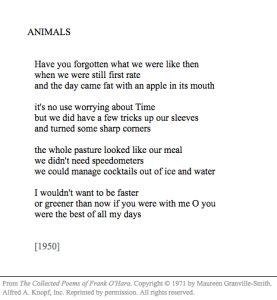Repetition? Okay, so now I’m aware of a recurring image in my poetry: the sky. While, in some aspects, I feel embarrassed that I never really thought twice about it, I feel conflicted about whether or not I should fight it. If the sky is a source of inspiration for me, why should I stifle it? Maybe the issue is that this is a popular, stereotypical poetry image.
The discourse I’m trying to begin here, though, isn’t about sky imagery. It’s about inspiration. Certainly I’m not the only writer who becomes obsessed with something so much that it, almost literally, consumes her? When I’m in one of these obsessive states, almost all of my poetry is conceived with the same topic as inspiration, or eventually ends up with a synonymous meaning. While I was not aware of the sky repetition, I am aware that this could come off as beating the topic to death. However, if it serves the purpose of producing poetry, why stop?
I suppose that the question I want to pose is whether or not these fixations can be stifling to one’s poetry, or if stifling them can be? Writing about the same things all the time eventually fizzles out the excitement and becomes boring to the writer, but how quickly does it become so for the reader?
This question, then, leads me to wonder about whether we write poetry for ourselves or for an audience? It is a conversation that I’ve been having in another English class, (and I apologize for this post being more fluid than defined), and we have yet to come to a conclusive agreement. At this point, I feel that if one were to write only for an audience, the product would suffer. For example, say you want to write a novel, but you know it won’t appeal to a popular audience; do you sell out and write something that does? Or do you write what you want anyway? If one were to write only for oneself, then it might not appeal to others, but it would bring personal satisfaction. I guess the question, here, becomes: which is more important?
Let’s say, then, that I currently have a fascination with flowers (original, I know). All of my poetry encompasses flowers and the workshop points it out and says that they grow tired of it. But it’s the force urging me to continue writing right now. Do I stop in order to please them? Or do I let the fixation play itself out and enjoy myself in the process? Maybe I’m selfish, but I think the latter sounds better. What are your thoughts?

